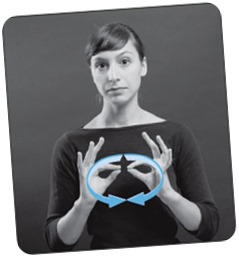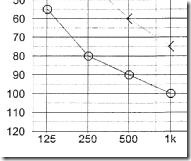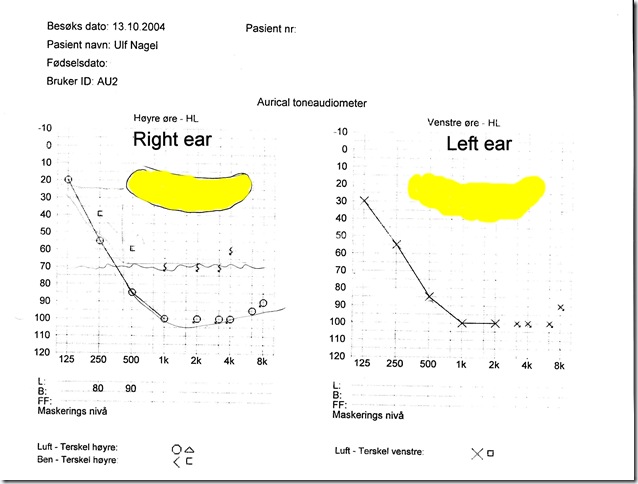Right now I’m writing from my temporary new home: Ål Folkehøyskole. I’m in the process of learning Norwegian sign language. This stage of rehabilitation will take me through the winter up until May 2014.
Why sign-language now, after two CI’s?
 Well, several reasons. Prime reason is that my wife and I found out we had to take some serious action if anything is going to change or improve with me (and along with me, the whole family). The biggest concern now is still severe fatigue (resulting in loss of cognitive skills, lack of concentration and sleep disturbances et al.) caused using the CI’s mixed with tinnitus and other immune system related issues.
Well, several reasons. Prime reason is that my wife and I found out we had to take some serious action if anything is going to change or improve with me (and along with me, the whole family). The biggest concern now is still severe fatigue (resulting in loss of cognitive skills, lack of concentration and sleep disturbances et al.) caused using the CI’s mixed with tinnitus and other immune system related issues.
The price to pay
 My wife pays the biggest price this year, being alone with two children with a fulltime job. I can’t begin to tell you how much indebted I feel. She is just awesome!
My wife pays the biggest price this year, being alone with two children with a fulltime job. I can’t begin to tell you how much indebted I feel. She is just awesome!
Then it’s the being apart from each others that all of us has to endure. Luckily I have my CI’s, and can Skype-chat with my children and wife.
My health, post-CI
Since my last CI-activation, I have focused on resting and getting rid of stress in order to get my energy back. Finding a balance has been my main goal. It has been a struggle (still is), for many reasons. Having a toddler who has trouble sleeping well at night due to medical reasons is one of them.
 Healthvise, the situation has improved. My physiscian and the health-system has been able to help me with several smaller health issues that in combination also took a lot of my energy before.
Healthvise, the situation has improved. My physiscian and the health-system has been able to help me with several smaller health issues that in combination also took a lot of my energy before.
Overall, things has improved to the extent I can tell the difference. But unfortunately, that is still not enough for me to be able to just live my life without concerns about my ability to function the next day. It takes a lot of time after so many years being chronically ill. Years actually.
Rebound
 What was hard to get into the latter year was the physical exercise that I have known for a long time was overdue. Being chronically fatigued means you just can’t exercise like any other person. In fact it can make your health worse. It’l like when an athlete is overtrained, he has to stop training.
What was hard to get into the latter year was the physical exercise that I have known for a long time was overdue. Being chronically fatigued means you just can’t exercise like any other person. In fact it can make your health worse. It’l like when an athlete is overtrained, he has to stop training.
Now I finally have a set of parameters in my life that allows me to focus on that. I am, 10 days into my school-year, well underway with great results and feeling well about it too. Mostly swimming, but also focus on diet and weight. When I get results from that regime, other things will follow, among them; more energy and less impact of winter depression (hopefully). This will be an interesting process.
CI and sign-language?
Yes, they combine well! CI is not only about hearing again, period. It is about hearing as well as you can. It is NOT ALWAYS the total solution. For a whole human being to maximize the profits of such technology, we have to consider the whole picture.
For me the CI presented the ability to hear quite well again after going (being?) deaf for nearly a decade (of which the last 5 years were totally unnecessary, but that is another issue). However, the CI cannot give everyone super-hearing again. For that the technology is still too crude, and the interface between man and machine is too poorly designed and developed. And let’s not forget that the brain is still the boss, no matter how good the technology is or how motivated an individual can be. If the brain has been left without sound-stimulations for too long, the brain develops in other directions, improving other areas in order to compensate. Inserting CI in a lifelong deaf person doesn’t make much sense in that aspect.
 The key here is SOCIAL HEARING. The ability to apprehend speech. I have trouble maintaining a meaningful conversation if there is other people speaking nearby, or if there is ambient noise around me. I can push and strain myself and achieve a fairly good result. But it has a very steep price; fatigue.
The key here is SOCIAL HEARING. The ability to apprehend speech. I have trouble maintaining a meaningful conversation if there is other people speaking nearby, or if there is ambient noise around me. I can push and strain myself and achieve a fairly good result. But it has a very steep price; fatigue.
Ambient noise wears me out
 With CI, I perceive all sounds around me, like I have never done before in my life. The sounds of an airconditioner, wind woshing in the trees, various creatures moving around, kitchen utilities running, children playing/singing/etc are all sounds that mixes with what I need; speech from someone communicating with me. That mixing of sounds gives the brain a lot of work, which in turn makes me quickly tired. Then add the tinnitus (which "fogs" incoming sounds too), the brain’s previously adapted compensating techniques of lip-reading, putting togheter pieces of comprehended words, guessing the missing parts etc etc. This all adds up to a bill that is simply too big for me (and my brain). It’s just not sustainable.
With CI, I perceive all sounds around me, like I have never done before in my life. The sounds of an airconditioner, wind woshing in the trees, various creatures moving around, kitchen utilities running, children playing/singing/etc are all sounds that mixes with what I need; speech from someone communicating with me. That mixing of sounds gives the brain a lot of work, which in turn makes me quickly tired. Then add the tinnitus (which "fogs" incoming sounds too), the brain’s previously adapted compensating techniques of lip-reading, putting togheter pieces of comprehended words, guessing the missing parts etc etc. This all adds up to a bill that is simply too big for me (and my brain). It’s just not sustainable.
I can’t function solely on CI for a whole day, let alone the rest of my life. hat’s why I’m learning sign language now; I need yet another compansation technique! One that supports all my other communications skills.
The biggest part of sign-language
The biggest "challenge" of sign-language for my family isn’t me learning sign-language. It is providing my family and people around me with the opportunity to learn it too! I’m fortunate to have a wife who understood this before I did (at least she was the one who saw the necessity for taking the big leap). Without her understanding, support and initiative, I would still be sitting home being tired all the time. But the support-system in this regard is just too weak and unsupportive here in Norway. We can do so much better.
 Communication is all about social interaction. We as humans are social beings. Without social interaction we are unlikely to be happy and contributing. The meaning of life is to live the life among other human beings, experience emotions and so on and so on. One person getting socially isolated is a burden for us all, not just the one.
Communication is all about social interaction. We as humans are social beings. Without social interaction we are unlikely to be happy and contributing. The meaning of life is to live the life among other human beings, experience emotions and so on and so on. One person getting socially isolated is a burden for us all, not just the one.
One deaf individual in a hearing community, can be a loss for the whole community. One deaf family member can be a loss for the whole family. Thats why rehabilitation of deafness also includes those around that individual.
to be continued….

 I had not thought about this issue from the aspect that Richard offered, which is such a beautiful thing about this form of communication (i.e. blogging); one thought or experience leads to another thought. Richard puts it so well in his letter, that I put it here, word for word. (Richard, you should seriously think about writing your own blog :-) )
I had not thought about this issue from the aspect that Richard offered, which is such a beautiful thing about this form of communication (i.e. blogging); one thought or experience leads to another thought. Richard puts it so well in his letter, that I put it here, word for word. (Richard, you should seriously think about writing your own blog :-) )





















